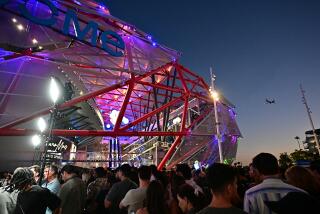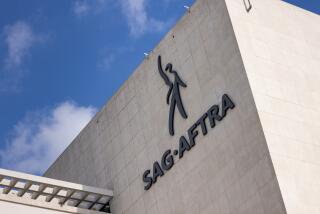Revised Bill Cuts Focus on 310 Overlay : Phones: Senate passes broader reform legislation after assemblymen drop effort to halt 11-digit dialing on Westside.
SACRAMENTO â Under attack by telephone industry lobbyists, Assemblyman Wally Knox and Assembly Speaker Antonio Villaraigosa on Thursday abandoned efforts to halt an overlay and 11-digit dialing in the 310 area code region in order to pass a broader reform bill.
The Senate passed the revised legislation on a 35-0 vote, sending it on to the Assembly where it was pending a floor vote late Thursday.
The compromise bill still requires a study for any future area code or overlay statewide--making telephone companies prove their claims that the unpopular measures are needed to provide continued phone service to consumers.
Ironically, however, it no longer directs the Public Utilities Commission to rescind an overlay and proposed 11-digit dialing in West Los Angeles and the South Bay--the very areas that pushed hardest for reform.
But the measure still puts on hold an overlay or split that is proposed for the 818 area code, which the Public Utilities Commission is expected to consider at its Sept. 16 meeting.
Knox and Villaraigosa, both Los Angeles Democrats, said they fought hard to overturn the overlay for the Westside, but were forced to abandon that portion of the legislation when it became clear that with it, the bill would fail in the Senate.
Telephone industry lobbyists swayed several senators by arguing that reversing the decision would be unfair to them because they had already spent a lot of money to implement the Westside overlay, Villaraigosa said.
âWe had to respond to that, and focus on getting reforms that would avoid a future 310 situation,â Villaraigosa said. âThese are far-reaching reforms for the future.â
Despite the setback, Villaraigosa and Knox held out hope that the Public Utilities Commission would take action on the Westside overlay anyway. If the bill had been defeated altogether, there would be no chance of averting an overlay and 11-digit numbers for the Westside, they said.
âThis was flat-out the most intense lobbying effort I have ever seen, bar none,â a visibly worn Knox said. âThey said they were going to pull out all the stops on this one, and they did. They just rolled through the Capitol.
âThis is the first, itâs not the best, but itâs the only state reform legislation on the books,â Knox added. âItâs a road map for how to solve the area code mess.â
The legislation, formerly AB 818 but now incorporated in a different bill, AB 406, is expected to reach the governorâs desk next week, officials said. Gov. Gray Davis has not taken a position on the measure.
AB 818 was incorporated into AB 406 earlier Thursday as part of a parliamentary maneuver to buy time and forge a compromise.
The legislation also requires phone companies to preserve current area codes to the extent possible, ensure that retired numbers are reused rapidly and utilize numbers more efficiently by exhausting one prefix before assigning numbers from another.
Finally, the bill mandates that the PUC establish a consumer education program regarding area code splits, overlays and number-conservation measures.
Telephone companies have implemented area code splits and overlays in New York City, Dallas, Houston, Denver, Atlanta and the entire state of Maryland with little opposition.
But the inconvenience of overlays--callers must dial 11 digits instead of seven for local calls--triggered a furor among customers in the 818 and 310 area codes, where phone companies pushed to introduce Californiaâs first area code overlays.
Bowing to public pressure, the Public Utilities Commission has vacillated in its plans to implement splits and overlays in the 310 and 818 calling areas.
The PUC is set to consider plans to move forward with a proposed overlay for the 310 area code, in addition to the split of the 818 calling area, at its Sept. 16 meeting.
State regulators have acknowledged the consumer frustration, confusion and expense associated with implementing either an overlay or split.
In response, the PUC has two petitions pending before the Federal Communications Commission seeking to broaden its authority in hopes of reducing area code overlays and splits.
PUC officials want permission to create separate area codes for fax machines, computer modems, cellular phones and pagers. They also want to reduce the amount of phone numbers given out at one time from 10,000 to 1,000.
Telephone companies, including Pacific Bell, are pressing for an area code overlay in the 310 and 818 regions. They say an overlay is the most efficient way to meet a surge in demand for additional phone numbers.
*
Bustillo reported from Sacramento and Haynes from Los Angeles.
More to Read
Get the L.A. Times Politics newsletter
Deeply reported insights into legislation, politics and policy from Sacramento, Washington and beyond. In your inbox three times per week.
You may occasionally receive promotional content from the Los Angeles Times.



![[20060326 (LA/A20) -- STATING THE CASE: Marchers organized by unions, religious organizations and immigrants rights groups carry signs and chant in downtown L.A. "People are really upset that all the work they do, everything that they give to this nation, is ignored," said Angelica Salas of the Coalition of Humane Immigrant Rights. -- PHOTOGRAPHER: Photographs by Gina Ferazzi The Los Angeles Times] *** [Ferazzi, Gina -- - 109170.ME.0325.rights.12.GMF- Gina Ferazzi/Los Angeles Times - Thousands of protesters march to city hall in downtown Los Angeles Saturday, March 25, 2006. They are protesting against House-passed HR 4437, an anti-immigration bill that opponents say will criminalize millions of immigrant families and anyone who comes into contact with them.]](https://ca-times.brightspotcdn.com/dims4/default/34f403d/2147483647/strip/true/crop/1983x1322+109+0/resize/840x560!/quality/75/?url=https%3A%2F%2Fcalifornia-times-brightspot.s3.amazonaws.com%2Fzbk%2Fdamlat_images%2FLA%2FLA_PHOTO_ARCHIVE%2FSDOCS%2854%29%2Fkx3lslnc.JPG)






